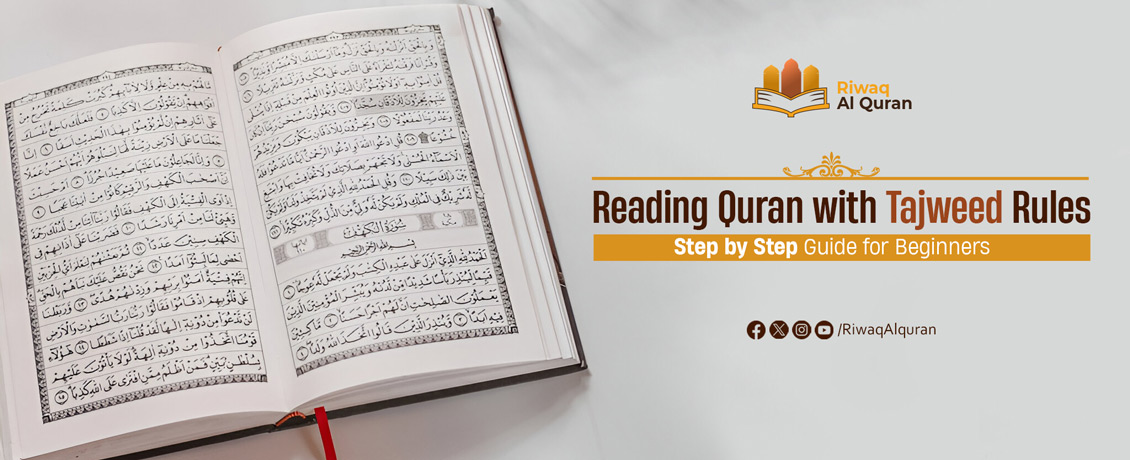Reading the Quran with Tajweed ensures flawless pronunciation, preserving its meaning while highlighting its divine beauty. By mastering rules like articulation (Makharij), elongation (Madd), and blending (Idgham), reciters honor the sacred words as revealed to the Prophet ﷺ, deepening their spiritual connection and transforming recitation into an act of devotion.
The Quran serves as both a source of divine guidance and a masterpiece of eloquence, deserving to be recited with precision and reverence. Tajweed, the discipline of rules guiding the accurate pronunciation and recitation of the Quran, is essential in safeguarding its meaning and elegance.
This guide delves into the importance of Tajweed, its advantages, the etiquettes of Quranic recitation, and practical techniques for mastering it, offering a valuable resource for anyone striving to enhance their recitation and deepen their connection with Allah.
Table of Contents
Reading the Quran Without Tajweed
Reading the Quran with Tajweed is highly encouraged because it ensures proper pronunciation, preserves the Quran’s beauty and helps avoid errors that could alter its meaning. Learning Tajweed is not just about technical rules; it’s a way to connect deeply with the Quran, honoring its divine origin. It reflects our dedication to reciting Allah’s words as they were revealed to Prophet Muhammad ﷺ.

Types of Reading the Quran with Tajweed Rules Rules
Tajweed encompasses a detailed set of principles that regulate the proper pronunciation of Arabic letters, ensuring the Quran is recited with precision and beauty. These principles can be broadly classified into two main categories:
1. Sifaat and Makharij (صفات ومخارج)
This category deals with the distinct traits (Sifaat) and places of articulation (Makharij) for each Arabic letter. It determines how letters are pronounced—whether the sound is heavy or light, sharp or soft—and ensures the correct formation of every letter. Mastery of these rules guarantees clarity and accuracy in recitation.
2. Ahkam (أحكام)
Ahkam includes the specific guidelines for reciting the Quran fluently and correctly. These rules cover elongation (Madd), merging of letters (Idgham), stopping (Waqf), and separating or connecting certain sounds. Following these rules allows for smooth and proper Quranic recitation, maintaining its divine flow and meaning.


Major and Minor Mistakes in Reading Quran with Tajweed:
When reading the Quran with Tajweed, mistakes can be categorized into major and minor errors based on their impact on pronunciation and overall recitation:
1. Major Mistakes لحن جلي
Major mistakes change the meaning of the words or verses, such as mispronouncing letters, incorrect articulation, and omitting letters. These mistakes can distort the recitation and affect the message of the Quran.
2. Minor Mistakes لحن خفي
Minor mistakes do not alter the meaning but affect the flow or clarity of recitation, like incorrect intonation, unnecessary stretching of sounds, or minor mistakes in pausing. These do not change the meaning but can make the recitation less precise.
Benefits of Reading the Quran with Tajweed
Learning Tajweed offers numerous benefits, both spiritually and personally:
- It enhances understanding of the Quran.
- Encourages mindfulness during recitation.
- Fosters spiritual growth and humility.
- Builds patience and discipline through practice.
- Strengthens connections to Islamic heritage and the Muslim community.
Read more about: Tajweed Classes London UK
Importance of Reading the Quran with Tajweed
Tajweed plays a vital role in proper Quran recitation. It ensures accurate pronunciation, preserving the meaning of the verses and preventing any misinterpretation. By following Tajweed rules, the beauty of recitation is enhanced, creating a more profound spiritual experience.
Reciting the Quran with Tajweed strengthens the connection with Allah’s words and brings immense spiritual fulfillment. Furthermore, it is highly rewarded, as numerous Hadiths highlight the virtues of reciting the Quran beautifully and correctly.
Read more about: Top 8 Tajweed Books in English For Kids
How to Read the Quran with Tajweed?

Have you learned the Tajweed rules but don’t know how to apply them when reading the Quran? Here are some fruitful tips to make the learning process easier:
1. Listen to Quran Recitation with Tajweed
The more you listen to Quranic recitation with Tajweed, the better you’ll understand how to apply the rules. Hearing the correct pronunciation repeatedly will reinforce your learning. Modern tools like QR code-linked Qurans can help you access recitations easily.
2. Write Down What You Learn
Mark the Tajweed rules in your Quran with a pencil and jot down notes about each rule. Repeat this practice for a few days, and over time, recognizing the rules will come naturally, InshaAllah.
3. Read the Quran Aloud
Reading the Quran aloud helps you get accustomed to applying the rules. It also makes it easier to notice and correct your mistakes. Regular practice will strengthen your recitation skills.
4. Teach Someone Else What You Have Learned
Teaching others is one of the best ways to solidify your understanding. When you explain a concept, you make an effort to get it right. You can also record yourself teaching the rules and reviewing how to apply them. Here is a beautiful story about Tajweed learning that teaches us the importance of Tajweed and how to master it.
5. Practice with a Qualified Teacher
A teacher can guide you in applying the Tajweed rules correctly and point out errors you may not notice on your own. Learning under a skilled instructor provides direct feedback and builds your confidence.
6. Dedicate Time for Daily Practice
Set aside a specific time every day to recite the Quran while focusing on Tajweed. Consistency is key to mastering anything, and Tajweed is no exception. Even 15 minutes of focused practice daily can yield significant improvement.
7. Join a Quran Study Group
Reciting in a group allows you to learn from others, exchange tips, and correct each other’s mistakes. It’s also a great way to stay motivated and connect with fellow learners.
Manners of Reading Quran with Tajweed Rules
Below are the etiquettes to observe when reading the Quran. By following them, you can build a stronger bond with the Quran and absorb its profound teachings more effectively.
1. Recite with a Focused Heart
Approach the Quran with sincerity and full attention. Ensure your mind and heart are free from distractions, allowing you to fully connect with the words of Allah. A calm and focused heart deepens your understanding and strengthens your bond with the Quran.
2. Reflect on the Meaning of the Verses
As you recite, take moments to ponder the meanings and messages conveyed in each verse. The Quran is a guide for all aspects of life, and reflecting on its wisdom helps you apply its teachings to your daily actions and decisions.
3. Begin with Istiaazah and Basmalah
Start your recitation by seeking refuge in Allah from Satan (Istiaazah) and saying “In the Name of Allah, the Most Compassionate, the Most Merciful” (Basmalah). This practice purifies your intention and sets the right tone for reading the Quran.
4. Dress Modestly and Neatly
Show respect for the Quran by wearing clean and modest clothing during recitation. This reflects reverence for the sacred words and helps create a respectful and serene environment for reading.
5. Sit Respectfully While Reading
Adopt a proper and respectful posture while reading the Quran. Sitting decently, whether on the floor or on a chair, reflects the admiration and high regard you have for the Book of Allah.
6. Avoid Talking During Recitation
Eliminate any distractions before beginning your recitation, such as unnecessary conversations or the use of electronic devices. Avoiding interruptions allows you to focus entirely on the words of Allah.
7. Place the Quran in an Elevated Position
Out of respect for the Quran, always place it on a clean, elevated surface when not holding it. Using a wooden bookstand or a clean pillow is common and signifies the Quran’s esteemed status among all books.
8. Hold the Quran in Your Right Hand
Whenever you hold the Quran, use your right hand as an act of following the Sunnah of the Prophet Muhammad (PBUH), who encouraged using the right hand for noble deeds.
9. Fulfill the Requirements of the Quran
Certain verses in the Quran contain marks indicating the need for prostration (Sajdah). Be mindful of performing these prostrations immediately upon recitation to fulfill this obligation and maintain focus on the Quranic teachings.
10. Avoid Eating or Drinking While Reading
Refrain from eating or drinking during Quran recitation. This helps you stay fully focused on the words of Allah and maintains the sanctity of the moment.
11. Treat the Quran with Respect
Ensure nothing is placed on top of the Quran, as it symbolizes its elevated status. Keeping it in a clean and honored position reflects the reverence due to this Holy Book.
12. Praise Allah After Recitation
Express gratitude to Allah for granting you the opportunity to recite His words. Thanking Allah at the end of your recitation cultivates a sense of humility and appreciation for this divine blessing.
13. Purify Your Intention and Heart Before Reading
Before opening the Quran, purify your heart and ensure your intention is solely to seek Allah’s pleasure and guidance. This inner preparation enhances the impact of your recitation and strengthens your connection with the Quran.
Top Quran with Tajweed Reading Rules

When discussing Tajweed, there are several key terms and rules that are frequently used to ensure proper recitation of the Quran. Below are some of the most important terms related to the Tajweed rules:
1. Waqf (Pausing)
Waqf is the practice of pausing or stopping at specific points in a verse to preserve the intended meaning and flow of the Quran.
2. Ghunna (Nasal Sound)
Ghunna is the nasal tone produced when pronouncing certain letters, particularly “ن” (Noon) and “م” (Meem), giving them a soft, resonant quality.
3. Tafkhim (Emphatic Pronunciation)
Tafkhim involves pronouncing specific letters with a heavy or bold tone, such as “ص,” “ض,” “ط,” and “ظ,” to add emphasis.
4. Tarqiq (Soft Pronunciation)
Tarqiq is the lighter pronunciation of certain letters, like “س” and “ف,” which contrasts with the heavier tone used in Tafkhim.
5. Ikhfaa (Concealment)
Ikhfaa involves partially blending one letter into the next, creating a seamless and smooth transition during recitation.
6. Idgham (Blending)
Idgham is the smooth merging of two letters, where the first letter’s sound blends into the second, commonly occurring with specific letter combinations.
7. Nabr in Tajweed (Emphasizing)
Nabr refers to emphasizing certain letters or syllables during recitation by stressing their sound. This helps ensure correct pronunciation and maintains the clarity of the Quran.
8. Izhar (Clear Pronunciation)
Izhar ensures a letter is pronounced clearly and distinctly without merging or blending it with the following letter.
9. Qalqalah (Bouncing Sound)
Qalqalah is the echo-like sound created by certain letters, such as “ق,” “ط,” “ب,” “ج,” and “د,” when they are recited with a pause or at the end of a word.
10. Sifaat Al-Huruf (Letter Characteristics)
This refers to understanding the unique traits of each letter, such as whether they are sharp, soft, or bold, which influences their pronunciation.
11. Harakat in Tajweed (Diacritical Marks)
Harakat are diacritical marks that guide proper pronunciation by indicating short vowel sounds or other rules. These include Fatha (ـَ) for “a,” Kasra (ـِ) for “i,” Damma (ـُ) for “u,” Sukoon (ـْ) for silence, and Shaddah (ـّ) for doubling a letter.
12. Madd (Prolongation)
Madd refers to lengthening the sound of certain vowels, extending them for two to six counts depending on specific rules.
Read more about: The Advanced Tajweed Rules
Is Reading Quran With Tajweed Obligatory?
The Quran was revealed with precise wording and meaning, making it Fard Kifayah to learn Tajweed to preserve its original form. As long as some Muslims fulfill this duty, others are not held accountable.
However, it is Wajib to apply Tajweed rules when reciting the Quran, particularly in prayer. This ensures that clear mistakes, such as mispronouncing letters or altering the verses, are avoided, as these errors can distort the meaning of the Quranic text.
Tajweed scholars have divided the mistakes made while reading the Quran into two:
- Lahn Jalee (Clear mistakes): Errors such as misreading the letter.
- Lahn Khafi (unobvious mistakes): Not applying Ikhfaa, Iqlab, Izhar, etc.
How Long Does It Take To Learn Tajweed To Be Able To Read Quran With Tajweed?
The time required to learn Tajweed varies based on individual learning speed, typically taking between 2 to 6 months on average. This duration can be shorter or longer depending on the person. Regular weekly lessons and dedicating specific time for practice greatly enhance productivity.
Riwaq Al Quran offers you the best Tajweed classes online with the availability to create your study plan and get personalized learning experience and regular feedback!
Is Tajweed Easy to Learn?
Learning to read the Quran beautifully with Tajweed is a journey that demands dedication, as all beautiful things require effort and patience. One key factor in this process is selecting the right teacher. For instance, learning Tajweed from an Arabic-speaking Quran teacher while simultaneously taking Quran lessons helps your ear become accustomed to the native Arabic accent and Tajweed rules, which can make the learning experience smoother and more effective.
Riwaq Al Quran, the online Quran and Tajweed learning platform that appeals to all over the world, offers you effective and flexible Tajweed lessons where you will get fast results. Click to start free Tajweed lessons now!


Learn Quran Reading with Tajweed for Beginners!
The process of mastering Tajweed requires continuous practice and review, and can be learned through accredited academies that offer structured programs, guiding students from beginner to proficiency in reciting the Quran correctly
Join Riwaq Al-Quran today and take the first step towards mastering the art of Quranic recitation. Enroll now and experience the beauty of reciting Allah’s words with precision and grace, while deepening your connection to the Quran and its timeless wisdom.
Riwaq Al Quran, the online Quran and Tajweed learning platform that appeals to all over the world, offers you effective and flexible Tajweed lessons where you will get fast results. Click to start free Tajweed lessons now!
We offer several courses such as:
- Online courses for kids.
- Online Quran classes for kids and adults.
- Online Arabic courses
- Online Ijazah courses
- Online Islamic Studies courses.
Here are a sample of our set of Quran Courses that will be helpful for you:
- Online Tafseer Course: Delve into Quranic meanings with our insightful online Tafseer course.
- Noorani Qaida Online: Learn Quranic basics efficiently through our Noorani Qaida online program.
- Online Quran Recitation Course: Enhance Quranic recitation skills through our expert-led online course.
- Online Tajweed Classes: Master Tajweed rules for beautiful Quranic recitation in online classes.
- Quran Memorization Online Course: Memorize the Quran effectively with our specialized online memorization course.
- Online Qirat Course: Explore diverse Qirat styles with our comprehensive online Qirat course.
Online Quran Classes for Kids: Nurture a love for the Quran in kids through interactive online classes.
Conclusion
Reading the Quran with Tajweed rules ensures accurate pronunciation, preserving its meaning and enhancing its beauty. Tajweed involves mastering the articulation points (Makharij) and unique characteristics (Sifaat) of Arabic letters, along with applying rules like elongation (Madd) and blending (Idgham). This precision prevents errors and reflects the Quran’s divine eloquence, fostering a deeper spiritual connection for the reader.
Mastering Tajweed is essential for reading the Quran as it was revealed to the Prophet ﷺ. It transforms recitation into a mindful act of worship, honoring the sanctity of Allah’s words. Through dedicated practice, guidance from qualified teachers, and tools like online courses, learners can perfect their recitation, deepening their bond with the Quran.


































